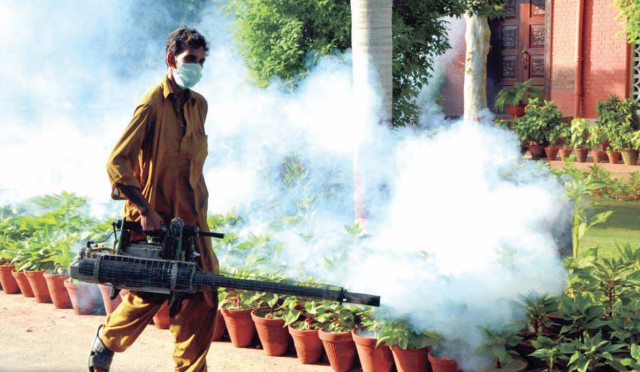Dengue outbreak: 11 more deaths push toll to 88 in Punjab
Shahbaz Sharif releases funds, provides field hospitals, issues NOCs for imports.

Eleven more people died from dengue on Saturday, taking the death toll in Punjab to 88. Of these, 83 have been from Lahore.
According to figures from the health department, 379 more cases of dengue were reported in Punjab on Saturday, of which 314 were from Lahore.
Desperate to reduce casualties, Punjab Chief Minister Shahbaz Sharif released Rs20 million to each teaching hospital to provide special treatment for dengue patients. Speaking to reporters, Secretary Agriculture Punjab Capt (retd) Arif Nadeem, Special Secretary Health Punjab Dawood Muhammad Khan Bareach, Director General Health Punjab Dr Aslam Chaudhry, Professor of medicine at King Edward Medical University Dr Moaz Ahmad and other officers said the government has launched a vigorous campaign to create awareness about the diagnosis and treatment of dengue. As a result, they said, the number of dengue patients at teaching hospitals has decreased.
Bareach said that the federal government has issued NOCs for imports of dextron-40 medicines from India. The Punjab health department has also placed import orders of drops costing Rs2 million. The company will provide these drops within four days.
Bareach added that a field hospital consisting of 16 beds will be provided to each teaching hospital in Lahore. He said that walk-in-interviews are on-going. 624 nurses have been recruited so far and the target is 1,000. Bareach said that medical experts from Sri Lanka have supplied standard operating procedures for the treatment of children with dengue fever.
Nadeem told the media that 150 more fogging machines are being imported and 200 foggers are already being used. He said that action has been taken against 70 medical stores for selling medicines for dengue fever at higher prices and also against 41 laboratories for charging more than Rs90 for a blood test.
The chief minister said that the first consignment of foggers from Germany had reached Lahore. Cell separators are also being imported, of which six would arrive on September 28. He said 50 cell analysers are also being purchased.
Dengue has also struck Rawalpindi, with 15 new confirmed cases on Saturday, taking the toll of positive cases in three hospitals to 79. In Karachi, one more person has died from the virus, taking the total death toll in Sindh to five. The total number of those who have contracted dengue in Karachi is 290. In Sindh the figure is 337.
The total number of dengue patients reported this year in Punjab is now 9,781, of which 8,769 were from Lahore. The deparment also revealed that, at present, 1,462 patients are being treated for dengue in various government and non-government hospitals in Punjab.
Published in The Express Tribune, September 25th, 2011.



















COMMENTS
Comments are moderated and generally will be posted if they are on-topic and not abusive.
For more information, please see our Comments FAQ